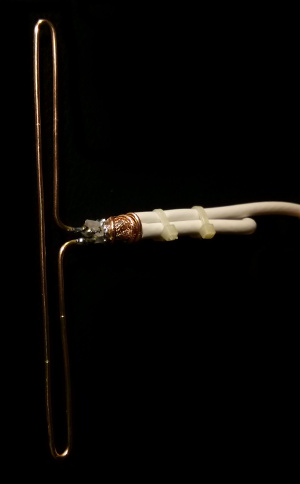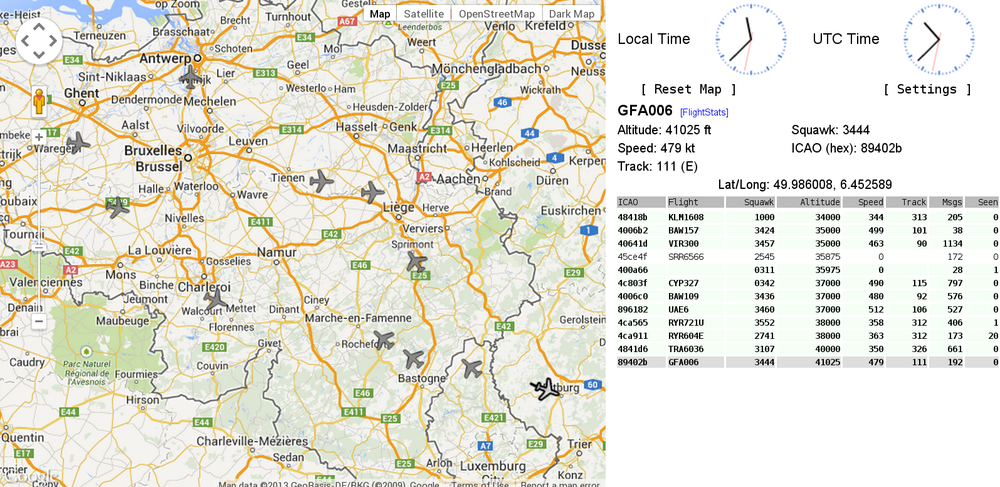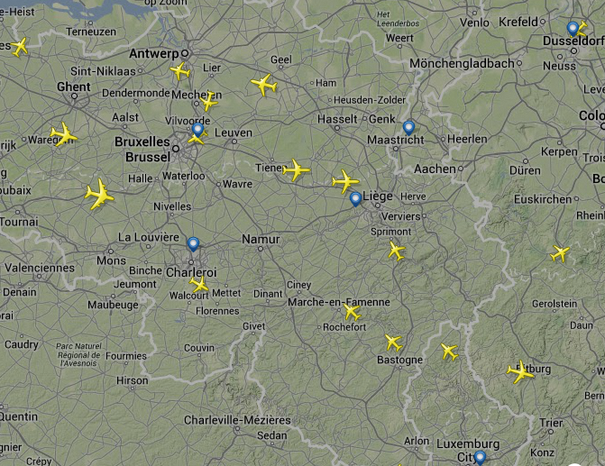Difference between revisions of "RTL-SDR"
m (→Resources) |
|||
| (31 intermediate revisions by the same user not shown) | |||
| Line 3: | Line 3: | ||
* http://rtlsdr.org/ |
* http://rtlsdr.org/ |
||
* http://www.rtl-sdr.com/ (blog) |
* http://www.rtl-sdr.com/ (blog) |
||
| + | * https://twitter.com/rtlsdrblog |
||
| + | * [http://www.amazon.com/gp/product/B00KCDF1QI/ Kindle book] |
||
* http://superkuh.com/rtlsdr.html (with list of apps) |
* http://superkuh.com/rtlsdr.html (with list of apps) |
||
| Line 31: | Line 33: | ||
E4K L-band gap: 1107 to 1241 MHz |
E4K L-band gap: 1107 to 1241 MHz |
||
</pre> |
</pre> |
||
| − | ==[http://www.trekstor.co.uk/detail-apple-accessories/product/Terres%20mini.html DVB-T Stick Terres mini]== |
+ | ==[http://www.trekstor.co.uk/detail-apple-accessories/product/Terres%20mini.html Trekstor DVB-T Stick Terres mini]== |
29.99€ at Saturn in Berlin |
29.99€ at Saturn in Berlin |
||
<br>'''NOT''' based on RTL2832!! |
<br>'''NOT''' based on RTL2832!! |
||
| Line 41: | Line 43: | ||
Manufacturer: MDTV Receiver |
Manufacturer: MDTV Receiver |
||
firmware: agent aborted loading dvb_nova_12mhz_b0.inp (not found?) |
firmware: agent aborted loading dvb_nova_12mhz_b0.inp (not found?) |
||
| + | </pre> |
||
| + | <pre> |
||
| + | $ rtl_test -t |
||
| + | No supported devices found. |
||
</pre> |
</pre> |
||
I promptly returned it to the shop. |
I promptly returned it to the shop. |
||
| + | |||
| − | ==rtl-sdr== |
||
| + | |||
| − | sudo apt-get install rtl-sdr |
||
| + | ==Kali-packaged softwares== |
||
| + | ===Install=== |
||
| + | Gnuradio v3.5 is available in [[LMDE]] but does not contain rtl-sdr support |
||
| + | <br>Gnuradio v3.7 is available in Debian but most third party sw does not support yet the v3.7 API |
||
| + | <br>Gnuradio v3.6 is available in [[Kali]] |
||
| + | <br>See [[Kali#Add_Kali_repositories_to_LMDE|here]] how to add Kali repositories, which is the one we'll choose. |
||
| + | <br>Add to /etc/apt/preferences.d/kali-package-repositories.pref |
||
| + | <pre> |
||
| + | Package: /gnuradio/ /^gr-/ /hackrf/ /rtlsdr/ kalibrate-rtl /libosmo/ gqrx /multimon/ /uhd-/ /libvolk/ |
||
| + | Pin: release n=kali |
||
| + | Pin-Priority: 990 |
||
| + | </pre> |
||
| + | |||
| + | apt-get install gnuradio gnuradio-dev gnuradio-doc libgnuradio-baz libgnuradio-grextras libgnuradio-iqbalance libgnuradio-osmosdr libgnuradio-osmosdr-apps \ |
||
| + | librtlsdr-bin hackrf-tools kalibrate-rtl rtlsdr-scanner gr-scan gqrx multimon-ng gr-air-modes |
||
| + | |||
| + | ===rtl-sdr=== |
||
| + | Is available in Debian as rtl-sdr and in Kali as librtlsdr-bin |
||
rtl_test -t |
rtl_test -t |
||
Play radio, 96.3MHz: |
Play radio, 96.3MHz: |
||
| Line 65: | Line 89: | ||
python heatmap.py survey.csv survey.png |
python heatmap.py survey.csv survey.png |
||
python heatmap.py fm_stations.csv fm_stations.png |
python heatmap.py fm_stations.csv fm_stations.png |
||
| + | ===GNURadio=== |
||
| + | * http://blog.opensecurityresearch.com/2012/06/getting-started-with-gnu-radio-and-rtl.html |
||
| + | ===[http://sourceforge.net/projects/gqrx/ gqrx]=== |
||
| + | gqrx |
||
| + | ===[https://github.com/EarToEarOak/RTLSDR-Scanner RTLSDR Scanner]=== |
||
| + | rtlsdr-scanner |
||
| + | If needed, can also come from sources: |
||
| + | git clone https://github.com/EarToEarOak/RTLSDR-Scanner |
||
| + | cd RTLSDR-Scanner/git |
||
| + | ln -s ../../pyrtlsdr/rtlsdr |
||
| + | ./rtlsdr_scan.py |
||
| + | ===kalibrate-rtl=== |
||
| + | kal |
||
| + | TODO |
||
| + | ===osmocom=== |
||
| + | osmocom_siggen |
||
| + | osmocom_siggen_nogui |
||
| + | osmocom_spectrum_sense |
||
| + | osmocom_fft |
||
| + | TODO |
||
| + | ===gr-scan=== |
||
| + | TODO |
||
| + | ===gr-air-modes=== |
||
| + | TODO |
||
==pyrtlsdr== |
==pyrtlsdr== |
||
| Line 92: | Line 140: | ||
./rtlizer 640x360+0+0 |
./rtlizer 640x360+0+0 |
||
Quite fast to scan quickly with arrow keys |
Quite fast to scan quickly with arrow keys |
||
| − | |||
| − | ==[http://sourceforge.net/projects/gqrx/ gqrx]== |
||
| − | Get latest and check for missing libs |
||
| − | ldd|grep found |
||
| − | apt-get install libzeroc-ice34 |
||
| − | ./gqrx |
||
==SDR#== |
==SDR#== |
||
| Line 114: | Line 156: | ||
ln -s /usr/lib/x86_64-linux-gnu/librtlsdr.so.0 librtlsdr.so |
ln -s /usr/lib/x86_64-linux-gnu/librtlsdr.so.0 librtlsdr.so |
||
mono SDRSharp.exe |
mono SDRSharp.exe |
||
| + | ==[https://en.wikipedia.org/wiki/Automatic_dependent_surveillance-broadcast ADS-B]== |
||
| − | ==GNURadio== |
||
| − | * http://blog.opensecurityresearch.com/2012/06/getting-started-with-gnu-radio-and-rtl.html |
||
| − | TODO |
||
| − | ==[https://en.wikipedia.org/wiki/Automatic_deACpendent_surveillance-broadcast ADS-B]== |
||
===rtl_adsb=== |
===rtl_adsb=== |
||
rtl-sdr contains already a basic decoder: |
rtl-sdr contains already a basic decoder: |
||
| Line 131: | Line 170: | ||
filename (a '-' dumps samples to stdout) |
filename (a '-' dumps samples to stdout) |
||
(omitting the filename also uses stdout) |
(omitting the filename also uses stdout) |
||
| − | </pre> |
||
| − | Example: |
||
| − | <pre> |
||
| − | ./rtl_adsb -V |
||
| − | [...] |
||
| − | *c5d3eaddaba63b95b36305a632a0; |
||
| − | DF=24 CA=5 |
||
| − | ICAO Address=d3eadd |
||
| − | PI=0xa632a0 |
||
| − | Type Code=21 S.Type/Ant.=3 |
||
| − | -------------- |
||
| − | *835d53aa49b5aca233339449a21c; |
||
| − | DF=16 CA=3 |
||
| − | ICAO Address=5d53aa |
||
| − | PI=0x49a21c |
||
| − | Type Code=9 S.Type/Ant.=1 |
||
| − | -------------- |
||
| − | *85ca7ba3ce33a2af6159b5aed168; |
||
| − | DF=16 CA=5 |
||
| − | ICAO Address=ca7ba3 |
||
| − | PI=0xaed168 |
||
| − | Type Code=25 S.Type/Ant.=6 |
||
| − | -------------- |
||
</pre> |
</pre> |
||
| Line 173: | Line 189: | ||
===Antenna=== |
===Antenna=== |
||
I decided to construct my own 1090MHz antenna and I chose a [https://en.wikipedia.org/wiki/File:Dipolehalfwavebalun.png folded dipole to coax 4:1 balun] because the folded dipole makes it more rigid than 2 wires dandling in opposite directions and the balun is very easy to do out of coax cable. |
I decided to construct my own 1090MHz antenna and I chose a [https://en.wikipedia.org/wiki/File:Dipolehalfwavebalun.png folded dipole to coax 4:1 balun] because the folded dipole makes it more rigid than 2 wires dandling in opposite directions and the balun is very easy to do out of coax cable. |
||
| − | <br>Instructions: half wavelength is ~137mm, so is the dipole length |
+ | <br>Instructions: half wavelength is ~137mm, so is the dipole length. Length of the coax balun is about 90mm with a velocity factor of 0.66. |
<br>That's it. |
<br>That's it. |
||
<br>See [https://en.wikipedia.org/wiki/File:Dipolehalfwavebalun.png pic from Wikipedia] for wiring. |
<br>See [https://en.wikipedia.org/wiki/File:Dipolehalfwavebalun.png pic from Wikipedia] for wiring. |
||
| − | <br>To be held vertically |
+ | <br><br>To be held vertically |
<br>[[Image:Antenna1090.jpg]] |
<br>[[Image:Antenna1090.jpg]] |
||
| − | <br>Here is a quick test done on the balcony (south-south-east) on 10/11/2013 at 23:37, a time when the sky was quite calm. |
+ | <br><br>Here is a quick test done with dump1090 (MalcolmRobb's fork) on the balcony (south-south-east) on 10/11/2013 at 23:37, a time when the sky was quite calm. |
| − | <br>[[Image:Dump1090_1.png|1000px]] |
+ | <br><br>[[Image:Dump1090_1.png|1000px]] |
| − | <br>I'm located in Brussels and the farthest |
+ | <br><br>I'm located in Brussels and the farthest aircraft seen is GFA6, travelling from London to Bahrain and passing over Bitburg, 183 km away from my little antenna. |
<br>Not that bad! |
<br>Not that bad! |
||
| − | <br>To compare, here is the exhaustive list of |
+ | <br><br>To compare, here is the exhaustive list of aircrafts by flightradar24 at the same time: |
| − | <br>[[Image:Dump1090_201311102337_flightradar.png|605px]] |
+ | <br><br>[[Image:Dump1090_201311102337_flightradar.png|605px]] |
| + | |||
| + | ==DAB== |
||
| + | ===rtltcpaccess=== |
||
| + | It allows to run the Terratec NOXON DAB MediaPlayer under wine, replacing the original RTL283XACCESS.dll by a hook to rtl_tcp |
||
| + | git clone https://github.com/steve-m/rtltcpaccess |
||
| + | ./dab_install.sh |
||
| + | Run in a window: |
||
| + | rtl_tcp |
||
| + | Then in another one: |
||
| + | wine "$(winepath -u "C:\Program Files\NOXON Media\NOXON DAB MediaPlayer\NOXON DAB MediaPlayer.exe")" |
||
| + | ===SDR-J=== |
||
| + | cf http://www.sdr-j.tk/index.html |
||
| + | <br>TODO |
||
==DVB-T== |
==DVB-T== |
||
After all it's initially a DVB-T receiver, isn't it? |
After all it's initially a DVB-T receiver, isn't it? |
||
* http://www.linuxtv.org/wiki/index.php/RealTek_RTL2832U |
* http://www.linuxtv.org/wiki/index.php/RealTek_RTL2832U |
||
| + | |||
| − | TODO |
||
| + | <!-- |
||
| + | ==TODO== |
||
| + | http://www.radioamatoripeligni.it/i6ibe/noaa_rtl2832/noaartl2832.htm |
||
| + | http://www.radioamatoripeligni.it/i6ibe/sdrsharp/sdrsharp.htm |
||
| + | http://www.radioamatoripeligni.it/i6ibe/tvsharp/tvsharp.htm |
||
| + | http://www.radioamatoripeligni.it/i6ibe/rtl2832hf/dongle.htm |
||
| + | http://www.radioamatoripeligni.it/i6ibe/panadapter/panadapter.htm |
||
| + | http://www.radioamatoripeligni.it/i6ibe/hdsdr/hdsdr.htm |
||
| + | http://www.radioamatoripeligni.it/i6ibe/ads-b/ads-b.htm |
||
| + | http://www.rtl-sdr.com/rtl-sdr-tutorial-analyzing-gsm-with-airprobe-and-wireshark/ |
||
| + | --> |
||
Latest revision as of 21:55, 19 May 2014
Resources
- http://sdr.osmocom.org/trac/wiki/rtl-sdr (with list of apps)
- http://rtlsdr.org/
- http://www.rtl-sdr.com/ (blog)
- https://twitter.com/rtlsdrblog
- Kindle book
- http://superkuh.com/rtlsdr.html (with list of apps)
Trekstor DVB-T Stick Terres 2.0
19.99€ at Saturn in Berlin
It contains hopefully the RTL2832U, together with Elonics E4000 tuner
Seen by lsusb as 1f4d:c803 G-Tek Electronics Group, which matches Lifeview LV5TDeluxe according to osmocom
/var/log/syslog
New USB device found, idVendor=1f4d, idProduct=c803 New USB device strings: Mfr=1, Product=2, SerialNumber=3 Product: RTL2838UHIDIR Manufacturer: Realtek SerialNumber: 00000001
$ rtl_test -t Found 1 device(s): 0: Lifeview LV5TDeluxe Using device 0: Lifeview LV5TDeluxe Found Elonics E4000 tuner Supported gain values (14): -1.0 1.5 4.0 6.5 9.0 11.5 14.0 16.5 19.0 21.5 24.0 29.0 34.0 42.0 Benchmarking E4000 PLL... [...] E4K range: 52 to 2212 MHz E4K L-band gap: 1107 to 1241 MHz
Trekstor DVB-T Stick Terres mini
29.99€ at Saturn in Berlin
NOT based on RTL2832!!
NOT recognized by rtl_test
New USB device found, idVendor=187f, idProduct=0202 New USB device strings: Mfr=1, Product=2, SerialNumber=0 Product: MDTV Receiver Manufacturer: MDTV Receiver firmware: agent aborted loading dvb_nova_12mhz_b0.inp (not found?)
$ rtl_test -t No supported devices found.
I promptly returned it to the shop.
Kali-packaged softwares
Install
Gnuradio v3.5 is available in LMDE but does not contain rtl-sdr support
Gnuradio v3.7 is available in Debian but most third party sw does not support yet the v3.7 API
Gnuradio v3.6 is available in Kali
See here how to add Kali repositories, which is the one we'll choose.
Add to /etc/apt/preferences.d/kali-package-repositories.pref
Package: /gnuradio/ /^gr-/ /hackrf/ /rtlsdr/ kalibrate-rtl /libosmo/ gqrx /multimon/ /uhd-/ /libvolk/ Pin: release n=kali Pin-Priority: 990
apt-get install gnuradio gnuradio-dev gnuradio-doc libgnuradio-baz libgnuradio-grextras libgnuradio-iqbalance libgnuradio-osmosdr libgnuradio-osmosdr-apps \ librtlsdr-bin hackrf-tools kalibrate-rtl rtlsdr-scanner gr-scan gqrx multimon-ng gr-air-modes
rtl-sdr
Is available in Debian as rtl-sdr and in Kali as librtlsdr-bin
rtl_test -t
Play radio, 96.3MHz:
rtl_fm -f 96.3e6 -W -s 200000 -r 48000 - | aplay -r 48k -f S16_LE
If needed, from sources:
git clone git://git.osmocom.org/rtl-sdr.git cd rtl-sdr mkdir build cd build cmake ../ make cd ../build/src ./rtl_test -t
Sources contain one additional tool:
./rtl_power -f 88M:108M:125k -1 fm_stations.csv ./rtl_power -f 100M:1G:1M -i 5m -1 survey.csv
To analyze the result:
wget -O heatmap.py http://kmkeen.com/tmp/heatmap.py.txt python heatmap.py survey.csv survey.png python heatmap.py fm_stations.csv fm_stations.png
GNURadio
gqrx
gqrx
RTLSDR Scanner
rtlsdr-scanner
If needed, can also come from sources:
git clone https://github.com/EarToEarOak/RTLSDR-Scanner cd RTLSDR-Scanner/git ln -s ../../pyrtlsdr/rtlsdr ./rtlsdr_scan.py
kalibrate-rtl
kal
TODO
osmocom
osmocom_siggen osmocom_siggen_nogui osmocom_spectrum_sense osmocom_fft
TODO
gr-scan
TODO
gr-air-modes
TODO
pyrtlsdr
Python wrapper for rtl-sdr
git clone https://github.com/roger-/pyrtlsdr
waterfall
git clone https://github.com/keenerd/rtlsdr-waterfall cd rtlsdr-waterfall ln -s ../pyrtlsdr/rtlsdr sudo apt-get install python-pyglet ./waterfall.py use: waterfall.py <lower freq> <upper freq> frequencies in hertz example: waterfall.py 929e6 930e6 arrow keys pan and zoom (shift for bigger steps) brackets to adjust gain click and drag to select A for autocorrelation C for constellation esc to quit ./waterfall.py 92e6 93e6
Quite detailed waterfall
Select with mouse -> constellation (C) or autocorrelation (A)
rtlizer
git clone https://github.com/csete/rtlizer ./build ./rtlizer 640x360+0+0
Quite fast to scan quickly with arrow keys
SDR#
sudo apt-get install mono-complete monodevelop sudo apt-get install libportaudio2 svn co https://subversion.assembla.com/svn/sdrsharp/trunk sdrsharp.svn cd sdrsharp.svn/ monodevelop
Open file .sdl
If opened as text, modify version 12 -> 11 and open again
Switch to Release; Build All; Exit
cd Release/
Edit SDRSharp.exe.config
=> enable RTLSDR
ln -s /usr/lib/x86_64-linux-gnu/libportaudio.so.2 libportaudio.so ln -s /usr/lib/x86_64-linux-gnu/librtlsdr.so.0 librtlsdr.so mono SDRSharp.exe
ADS-B
rtl_adsb
rtl-sdr contains already a basic decoder:
Use: rtl_adsb [-R] [-g gain] [-p ppm] [output file] [-d device_index (default: 0)] [-V verbove output (default: off)] [-S show short frames (default: off)] [-Q quality (0: no sanity checks, 0.5: half bit, 1: one bit (default), 2: two bits)] [-e allowed_errors (default: 5)] [-g tuner_gain (default: automatic)] [-p ppm_error (default: 0)] filename (a '-' dumps samples to stdout) (omitting the filename also uses stdout)
dump1090
Dumping ADS-B aeronautic data from 1090MHz
sudo apt-get install librtlsdr-dev git clone https://github.com/antirez/dump1090.git make
Usage:
./dump1090 ./dump1090 --help ./dump1090 --interactive --net --enable-agc --metric
With "--net" go to http://127.0.0.1:8080
Actually this fork is much more advanced:
git clone https://github.com/MalcolmRobb/dump1090 make
Antenna
I decided to construct my own 1090MHz antenna and I chose a folded dipole to coax 4:1 balun because the folded dipole makes it more rigid than 2 wires dandling in opposite directions and the balun is very easy to do out of coax cable.
Instructions: half wavelength is ~137mm, so is the dipole length. Length of the coax balun is about 90mm with a velocity factor of 0.66.
That's it.
See pic from Wikipedia for wiring.
To be held vertically

Here is a quick test done with dump1090 (MalcolmRobb's fork) on the balcony (south-south-east) on 10/11/2013 at 23:37, a time when the sky was quite calm.

I'm located in Brussels and the farthest aircraft seen is GFA6, travelling from London to Bahrain and passing over Bitburg, 183 km away from my little antenna.
Not that bad!
To compare, here is the exhaustive list of aircrafts by flightradar24 at the same time:

DAB
rtltcpaccess
It allows to run the Terratec NOXON DAB MediaPlayer under wine, replacing the original RTL283XACCESS.dll by a hook to rtl_tcp
git clone https://github.com/steve-m/rtltcpaccess ./dab_install.sh
Run in a window:
rtl_tcp
Then in another one:
wine "$(winepath -u "C:\Program Files\NOXON Media\NOXON DAB MediaPlayer\NOXON DAB MediaPlayer.exe")"
SDR-J
cf http://www.sdr-j.tk/index.html
TODO
DVB-T
After all it's initially a DVB-T receiver, isn't it?